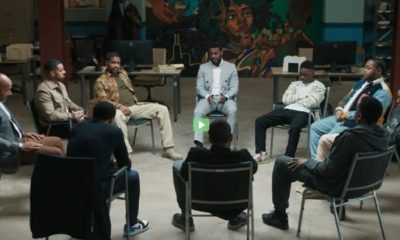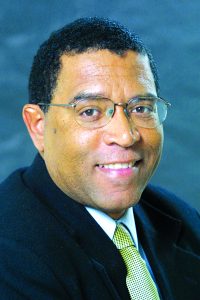#NNPA BlackPress
Lorraine Toussaint: Veteran Actress Talks ‘The Village’ and Brooklyn
NNPA NEWSWIRE — “You know, there’s a point in your career where you take whatever you can get. And then early on in my career, I realized, oh, I don’t want to do that. I actually want to do certain kinds of roles,” says the Trinidadian born actress. “You then begin to be brave enough to begin to say no to certain things. And then there comes a time, when you reach a point in your career where you intuitively choose certain kinds of work. I’m so pleased to be at that point and that I’m still relevant,” she adds.
By Nsenga K. Burton, Ph.D., NNPA Newswire Contributor
Lorraine Toussaint has plans. The SAG award-winner and NAACP Image award nominee that has an acting career that spans more than thirty years, is starring as Patricia on NBC’s mid-season replacement “The Village,” a show about a motley crew of residents living in a building in Brooklyn with interconnected lives. Filling the time slot of NBC’s mega hit “This Is Us,” “The Village” features an ensemble cast made up of a “who’s who” of television stars (Dominic Chianese, Frankie Faison, Moran Atias, Michaela McManus, Jerod Haynes, Grace Van Dien, Warren Christie and Daren Kagasoff) working together to convey the story of a “family” supporting each other as their lives unfold.
Toussaint, whose career began on the stage, worked for many years in television as a guest star on iconic television shows like “Law & Order,” “Crossing Jordan” and “Ugly Betty.” In recent years, Toussaint has moved from the margins to the center of the drama, most notably as inmate Vee on Netflix’s Orange is the New Black, which earned Toussaint a Critic’s Choice TV award. Driven, Toussaint currently stars in season three of AMC’s “Into the Badlands,” and recently wrapped filming of Julie Taymor’s film, The Glorias, where she plays feminist icon and civil rights legend Flo Kennedy.

Toussaint is an actress who has had the opportunity to play a wide variety of roles, from a concerned mother on “Rosewood,” to a futuristic prophetess on “The Badlands” to civil rights activist Amelia Boynton (Robinson) in Ava Duvernay’s film Selma. When discussing how she chooses characters while promoting “The Village” at SCAD’s aTVfest, Toussaint talks about the journey from taking roles you can actually get to actively deciding to be brave and bold in her choices.
“You know, there’s a point in your career where you take whatever you can get. And then, early on in my career, I realized, oh, I don’t want to do that. I actually want to do certain kinds of roles,” says the Trinidadian born actress. “You then begin to be brave enough to begin to say no to certain things. And then there comes a time, when you reach a point in your career where you intuitively choose certain kinds of work. I’m so pleased to be at that point and that I’m still relevant,” she adds.
Toussaint spent the first 12 years of her acting career on stage, honing her craft and getting the proper training to ensure a long career. In addition to training, Toussaint says she figured out that how she chose roles was as important as getting them or just getting a paycheck. “When you’re well past 50, heading to 60, you reflect on your career. I’ve gotten brave again,” says Toussaint. “I don’t care so much about how it looks or what anybody thinks about it anymore. I’m really going by my own inner barometer, my own moral compass, my own creative impulses, and that feels good,” adds the Brooklyn bred thespian.
“The Village,” which takes place in Brooklyn, is a homecoming for Toussaint, who got the call while filming “Into the Badlands,” in Ireland. “You can’t be in Brooklyn and not have Caribbean representation,” Toussaint offers. “I wanted to make sure that Mike Daniels (showrunner) brought that culture into the show which you see in Season One.” Toussaint incorporates her upbringing and Trinidadian culture into the character of Patricia when bringing her to life.
“It’s something about the way in which I was raised and having been self-governed,” Toussaint reflects. “Coming from a country that is self-governed, where I was never a minority, I didn’t grow up knowing myself to be a minority of any kind, as a woman or as a woman of color. I came from these Amazonian black women, and we never measured ourselves against white people because they weren’t a thought,” Toussaint states matter-of-factly when discussing her childhood.
Toussaint brings this perspective into her character whose life is interconnected with the others in the house including a single mother, a veteran, a law school student and a nurse to name a few. Their struggles involve everything from PTSD to immigration to teen pregnancy, but they manage to get through it. Patricia is one half of an older, black couple who are still in love and still helping to guide and support their makeshift family. Patricia and Ron (Faison) work together to ensure the family remains intact.
Toussaint is proud to bring this type of relationship to television – one with older black people loving each other and their neighbors unconditionally. Playing Patricia gives her an opportunity to show the complexity of black women.
“We [Black Women] are so many things and we aren’t often allowed to show all of those qualities on TV,” Toussaint muses. “This show is different. I play a black mama but I am allowed to be vulnerable, sexy, right, wrong and that’s why she’s interesting. She’s familiar yet different.”
Familiarity yet difference is what makes “The Village” special. “It feels easy and relatable,” says Toussaint. When asked what she wants audiences to get from this show, the enduring actress ponders momentarily. “I want audiences to wish they lived in this building or in this community. I want people to realize it actually takes small gestures to reach out to someone where they are in order to create a little village of your own.”
Toussaint is part of a larger village of black actresses with staying power and the ability to move between television and film in a variety of roles. In an industry that can be fickle and brutal, particularly when it comes to women and women of color, Toussaint’s longevity is remarkable. “I always knew I was going to be a long-distance runner in this business,” Toussaint quips. “I’m grateful that I’m still here, love to go to work every day and in the trenches with such creative talent. I’m especially grateful that you guys still want to see me,” says the veteran actress.
“The Village” airs on NBC at 9 p.m. EST. Check local listings for channel information.
This post was written by Nsenga K Burton, Ph.D., founder & editor-in-chief of The Burton Wire. An expert in intersectionality and media industries, Dr. Burton is also a professor of film and television and co-editor of the book, Black Women’s Mental Health: Balancing Strength and Vulnerability. Follow her on Twitter @Ntellectual or @TheBurtonWire.
#NNPA BlackPress
Chavis and Bryant Lead Charge as Target Boycott Grows
BLACKPRESSUSA NEWSWIRE — Surrounded by civil rights leaders, economists, educators, and activists, Bryant declared the Black community’s power to hold corporations accountable for broken promises.

By Stacy M. Brown
BlackPressUSA.com Senior National Correspondent
Calling for continued economic action and community solidarity, Dr. Jamal H. Bryant launched the second phase of the national boycott against retail giant Target this week at New Birth Missionary Baptist Church in Atlanta. Surrounded by civil rights leaders, economists, educators, and activists, Bryant declared the Black community’s power to hold corporations accountable for broken promises. “They said they were going to invest in Black communities. They said it — not us,” Bryant told the packed sanctuary. “Now they want to break those promises quietly. That ends tonight.” The town hall marked the conclusion of Bryant’s 40-day “Target fast,” initiated on March 3 after Target pulled back its Diversity, Equity, and Inclusion (DEI) commitments. Among those was a public pledge to spend $2 billion with Black-owned businesses by 2025—a pledge Bryant said was made voluntarily in the wake of George Floyd’s murder in 2020.“No company would dare do to the Jewish or Asian communities what they’ve done to us,” Bryant said. “They think they can get away with it. But not this time.”
The evening featured voices from national movements, including civil rights icon and National Newspaper Publishers Association (NNPA) President & CEO Dr. Benjamin F. Chavis Jr., who reinforced the need for sustained consciousness and collective media engagement. The NNPA is the trade association of the 250 African American newspapers and media companies known as The Black Press of America. “On the front page of all of our papers this week will be the announcement that the boycott continues all over the United States,” said Chavis. “I would hope that everyone would subscribe to a Black newspaper, a Black-owned newspaper, subscribe to an economic development program — because the consciousness that we need has to be constantly fed.” Chavis warned against the bombardment of negativity and urged the community to stay engaged beyond single events. “You can come to an event and get that consciousness and then lose it tomorrow,” he said. “We’re bombarded with all of the disgust and hopelessness. But I believe that starting tonight, going forward, we should be more conscious about how we help one another.”
He added, “We can attain and gain a lot more ground even during this period if we turn to each other rather than turning on each other.” Other speakers included Tamika Mallory, Dr. David Johns, Dr. Rashad Richey, educator Dr. Karri Bryant, and U.S. Black Chambers President Ron Busby. Each speaker echoed Bryant’s demand that economic protests be paired with reinvestment in Black businesses and communities. “We are the moral consciousness of this country,” Bryant said. “When we move, the whole nation moves.” Sixteen-year-old William Moore Jr., the youngest attendee, captured the crowd with a challenge to reach younger generations through social media and direct engagement. “If we want to grow this movement, we have to push this narrative in a way that connects,” he said.
Dr. Johns stressed reclaiming cultural identity and resisting systems designed to keep communities uninformed and divided. “We don’t need validation from corporations. We need to teach our children who they are and support each other with love,” he said. Busby directed attendees to platforms like ByBlack.us, a digital directory of over 150,000 Black-owned businesses, encouraging them to shift their dollars from corporations like Target to Black enterprises. Bryant closed by urging the audience to register at targetfast.org, which will soon be renamed to reflect the expanding boycott movement. “They played on our sympathies in 2020. But now we know better,” Bryant said. “And now, we move.”
#NNPA BlackPress
The Department of Education is Collecting Delinquent Student Loan Debt
BLACKPRESSUSA NEWSWIRE — the Department of Education will withhold money from tax refunds and Social Security benefits, garnish federal employee wages, and withhold federal pensions from people who have defaulted on their student loan debt.

By April Ryan
Trump Targets Wages for Forgiven Student Debt
The Department of Education, which the Trump administration is working to abolish, will now serve as the collection agency for delinquent student loan debt for 5.3 million people who the administration says are delinquent and owe at least a year’s worth of student loan payments. “It is a liability to taxpayers,” says White House Press Secretary Karoline Leavitt at Tuesday’s White House Press briefing. She also emphasized the student loan federal government portfolio is “worth nearly $1.6 trillion.” The Trump administration says borrowers must repay their loans, and those in “default will face involuntary collections.” Next month, the Department of Education will withhold money from tax refunds and Social Security benefits, garnish federal employee wages, and withhold federal pensions from people who have defaulted on their student loan debt. Leavitt says “we can not “kick the can down the road” any longer.”
Much of this delinquent debt is said to have resulted from the grace period the Biden administration gave for student loan repayment. The grace period initially was set for 12 months but extended into three years, ending September 30, 2024. The Trump administration will begin collecting the delinquent payments starting May 5. Dr. Walter M. Kimbrough, president of Talladega College, told Black Press USA, “We can have that conversation about people paying their loans as long as we talk about the broader income inequality. Put everything on the table, put it on the table, and we can have a conversation.” Kimbrough asserts, “The big picture is that Black people have a fraction of wealth of white so you’re… already starting with a gap and then when you look at higher education, for example, no one talks about Black G.I.’s that didn’t get the G.I. Bill. A lot of people go to school and build wealth for their family…Black people have a fraction of wealth, so you already start with a wide gap.”
According to the Education Data Initiative, https://educationdata.org/average-time-to-repay-student-loans It takes the average borrower 20 years to pay their student loan debt. It also highlights how some professional graduates take over 45 years to repay student loans. A high-profile example of the timeline of student loan repayment is the former president and former First Lady Barack and Michelle Obama, who paid off their student loans by 2005 while in their 40s. On a related note, then-president Joe Biden spent much time haggling with progressives and Democratic leaders like Senators Elizabeth Warren and Chuck Schumer on Capitol Hill about whether and how student loan forgiveness would even happen.
#NNPA BlackPress
VIDEO: The Rev. Dr. Benjamin F. Chavis, Jr. at United Nations Permanent Forum on People of African Descent
https://youtu.be/Uy_BMKVtRVQ Excellencies: With all protocol noted and respected, I am speaking today on behalf of the Black Press of America and on behalf of the Press of People of African Descent throughout the world. I thank the Proctor Conference that helped to ensure our presence here at the Fourth Session of the […]

Excellencies:
-

 Activism4 weeks ago
Activism4 weeks agoOakland Post Endorses Barbara Lee
-

 Activism3 weeks ago
Activism3 weeks agoOakland Post: Week of April 2 – 8, 2025
-

 #NNPA BlackPress3 weeks ago
#NNPA BlackPress3 weeks agoTrump Profits, Black America Pays the Price
-

 Activism2 weeks ago
Activism2 weeks agoOakland Post: Week of April 9 – 15, 2025
-

 #NNPA BlackPress3 weeks ago
#NNPA BlackPress3 weeks agoHarriet Tubman Scrubbed; DEI Dismantled
-

 #NNPA BlackPress3 weeks ago
#NNPA BlackPress3 weeks agoTrump Targets a Slavery Removal from the National Museum of African-American History and Culture
-

 #NNPA BlackPress3 weeks ago
#NNPA BlackPress3 weeks agoLawmakers Greenlight Reparations Study for Descendants of Enslaved Marylanders
-

 #NNPA BlackPress3 weeks ago
#NNPA BlackPress3 weeks agoNew York Stands Firm Against Trump Administration’s Order to Abandon Diversity in Schools




























































1 Comment